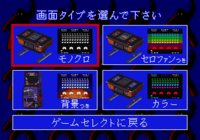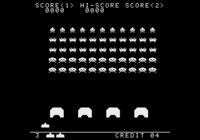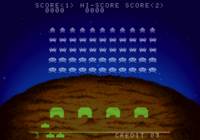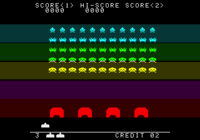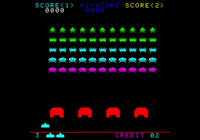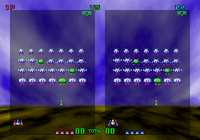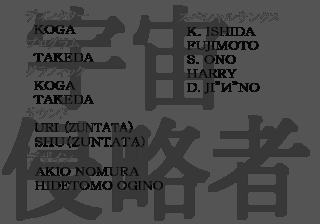Space Invaders (1996)
From Sega Retro
| Space Invaders | ||||||||||
|---|---|---|---|---|---|---|---|---|---|---|
| System(s): Sega Saturn | ||||||||||
| Publisher: Taito | ||||||||||
| Developer: Taito | ||||||||||
| Original system(s): Arcade boards | ||||||||||
| Sound driver: SCSP/CD-DA (2 tracks) | ||||||||||
| Genre: Shooting[1][2] | ||||||||||
| Number of players: 1-2 | ||||||||||
| ||||||||||
|
Space Invaders (スペースインベーダー) is a fixed shooter game released for the Sega Saturn by Taito in 1996. Released exclusively in Japan, it is a port of the 1993 arcade game Space Invaders DX.
The game was later bundled with Puzzle Bobble 2X in Puzzle Bobble 2X & Space Invaders.
Contents
Gameplay
The Original Game (オリジナルゲーム) mode contains four variations of the original Space Invaders arcade game. The 2P Battle (2P対戦ゲーム) mode is a competitive, split-screen mode using new graphics.
In either mode, players must destroy waves of incoming alien invaders. Enemies arrange themselves in formations and march down to the bottom of the screen by moving to the side of the screen and then downward. The invaders move faster as more are destroyed. In the Original Game, players control laser turrets; in the 2P Battle, players control spaceships. The laser turret or spaceship moves with ![]() or
or ![]() and shoots with
and shoots with ![]() ,
, ![]() , or
, or ![]() . They can only fire one shot at a time and cannot fire another shot until the original shot has hit an enemy or moved off the screen.
. They can only fire one shot at a time and cannot fire another shot until the original shot has hit an enemy or moved off the screen.
Original Game
This mode recreates the original Space Invaders arcade game. There are four different screen types to select, which are designed to replicate the arcade machines for the original Space Invaders. After starting a game, the player can change the screen type with ![]() or
or ![]() and insert credits with
and insert credits with ![]() or
or ![]() . Once at least one credit has been inserted, the player can start a single-player game by pressing START on the first control pad. If there are at least two credits inserted, players can start a two-player game by pressing START on the second control pad. Two-player games are the same as one-player games, except players take turns after one player loses a life.
. Once at least one credit has been inserted, the player can start a single-player game by pressing START on the first control pad. If there are at least two credits inserted, players can start a two-player game by pressing START on the second control pad. Two-player games are the same as one-player games, except players take turns after one player loses a life.
In this mode, four defensive bunkers are placed above the player, which provide protection from enemy fire. The bunkers become damaged when hit by fire from either the invaders or the player, which eventually destroys them. A UFO occasionally flies across the top of the screen, which can be shot down for bonus points.
When a wave has been destroyed, the next round begins with a new wave of aliens appearing slightly lower than the last. Eventually, the wave spawns with the bottom row right on top of the bunkers. Then the next wave starts from the top of the screen, and subsequent waves are spawned progressively lower again. This loop continues until the game ends.
The player has three lives and loses one whenever the laser turret is hit by an enemy. Extra lives are awarded for every 1,500 points earned. The game ends immediately if an alien reaches the bottom of the screen.
In the options, the player can change the number of starting lives (between 3 and 6), the number of points to earn an extend (1,000 or 1,500), and the starting round (between 1 and 7).
Enemies
| Octopus | |
|---|---|
| Worth 10 points. | |
| Crab | |
| Worth 20 points. | |
| Squid | |
| Worth 30 points. | |
| UFO | |
| This enemy occasionally flies quickly across the top of the screen and randomly awards 50, 100, 150, 200, or 300 points if destroyed. |
Screen types
2P Battle
This mode is a two-player competitive mode where each player plays a separate game at the same time in a split screen. When one player is eliminated, either by running out of lives or by having an alien reach the bottom of the playfield, the other player wins a point. Matches can be played up to a certain number of points (1, 2, or 3). When the match is played for more than one point, both playfields reset after a player loses a game and the players face new alien waves, which repeats until a player earns enough points to win the match.
There are no defensive bunkers in this mode. Players can shoot at each other; shots that reach the top of the screen without hitting an enemy reappear on the other player's side, with the horizontal position flipped and moving downward instead of upward. A green outline of the player's ship appears on the top of the other player's side to show where the shot will appear if it reaches the end of the screen.
Before starting the game, each player can separately choose the difficulty level (Easy, Normal, or Hard) and the number of starting lives.
Special enemies
Alien waves contain special enemies that cycle colors and have special effects depending on what color they are when they are destroyed.
| Green | |
|---|---|
| Eliminates the entire row of enemies for the player. | |
| Red | |
| Causes the opponent's formation to drop down one step. | |
| Yellow | |
| Causes the opponent's formation to drop down two steps. | |
| UFO | |
| Causes the opponent's formation to drop down three steps. As in the original game, this enemy sometimes flies quickly across the top of the screen. |
Versions
The game is a port of the arcade game Space Invaders DX, released in 1993 to commemorate the 15th anniversary of the original arcade game. In addition to the Saturn port, Space Invaders DX was also ported to the Super NES in 1994 as Space Invaders: The Original Game, to the Super CD-ROM² in 1995 as Space Invaders: The Original Game, and to the PlayStation in 1998 as Space Invaders 2000.
Production credits
- ディレクター: Koga
- プログラム: Takeda
- グラフィック: Koga, Takeda
- サウンド: Uri (Zuntata), Shu (Zuntata)
- デザイン: Akio Nomura, Hidetomo Ogino
- スペシャルサンクス: K. Ishida, Fujimoto, S. Ono, Harru, D. Ji"ᴎ"no
Magazine articles
- Main article: Space Invaders (1996)/Magazine articles.
Physical scans
| Sega Retro Average | ||||||||||||||||||||||||||||||||||
|---|---|---|---|---|---|---|---|---|---|---|---|---|---|---|---|---|---|---|---|---|---|---|---|---|---|---|---|---|---|---|---|---|---|---|
|
| 43 | |
|---|---|
| Based on 6 reviews | |
Technical information
- Main article: Space Invaders (1996)/Technical information.
References
NEC Retro has more information related to Space Invaders: The Original Game
|
- ↑ File:SpaceInvaders Saturn JP Box Back.jpg
- ↑ 2.0 2.1 https://sega.jp/fb/segahard/ss/soft_licensee2.html (Wayback Machine: 2020-03-20 23:05)
- ↑ File:Space Invaders Saturn credits.png
- ↑ Famitsu, "1996-12-20" (JP; 1996-12-06), page 1
- ↑ Fun Generation, "03/97" (DE; 1997-02-12), page 76
- ↑ Saturn Fan, "1996 No. 25" (JP; 1996-11-29), page 184
- ↑ Saturn Fan, "1997 No. 3" (JP; 1997-01-31), page 66
- ↑ Sega Saturn Magazine, "1996-21 (1996-12-13)" (JP; 1996-11-22), page 272
- ↑ Sega Saturn Magazine, "Readers rating final data" (JP; 2000-03), page 16
| Space Invaders (1996) | |
|---|---|
|
Main page | Hidden content | Magazine articles | Reception | Technical information | |
| Space Invaders games for Sega systems |
|---|
| Space Invaders (1985) | Space Invaders '90 (1990) | Super Space Invaders (1992) | Space Invaders (1996) |
| Space Invaders (Dreamcast) (unreleased) |
| Space Invaders VIC Dual Clones |
| Alpha Fighter (19??) | Invinco (1979) | Space Attack (1979) | Super Space Attack (1979) |

